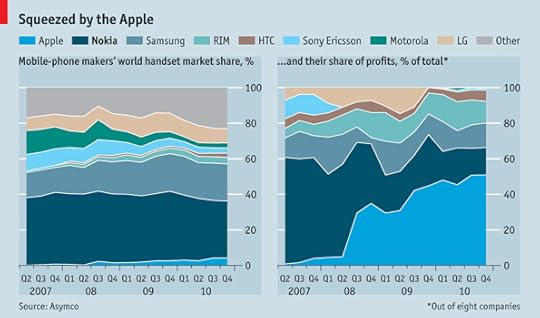Smartphone Futures: Nokia & Microsoft
[image error]How mighty Nokia has fallen. Today, Nokia announced a "strategic alliance" with once arch-enemy Microsoft. In so many ways, this looks like a stealth takeover. After all, former Microsoft leading light Stephen Elop became CEO of Nokia in September. A mere five months later, he announces that Windows Phone 7 will become Nokia's "primary platform" for smartphones.
To Elop's credit, it is quite true that Nokia was standing on a burning platform, and there were few good options for the storied mobile leader. Once, Nokia was Europe's strongest technology company: in the 1990s Europe had standardized on Nokia's as the platform of choice — Symbian was on 330 million phones! When I was studying mobile trends at Adobe's Advanced Tech Lab in the 90s and early 2000s, Europe was the place to be for mobile innovation. Silicon Valley was far behind.
The iPhone changed all this in 2007. Gradually, Apple cornered half the profits in mobility — even though Nokia still had the lion's share of the market.  (See this chart from the Economist for details.) American install base rapidly surpassed Europe, and the iPhone became the dominant mobile paradigm — at least on the high end. On the low end, Chinese cheap phones crept into the developing world, and took over 1/3 of the market. In 2010, Huawei brought in $28 billion in revenues (and nearly $3 billion in profits!), matching Sony Ericsson point for point. The game was almost over for Europe — and for Nokia.
(See this chart from the Economist for details.) American install base rapidly surpassed Europe, and the iPhone became the dominant mobile paradigm — at least on the high end. On the low end, Chinese cheap phones crept into the developing world, and took over 1/3 of the market. In 2010, Huawei brought in $28 billion in revenues (and nearly $3 billion in profits!), matching Sony Ericsson point for point. The game was almost over for Europe — and for Nokia.
The real story behind the Nokia+Microsoft deal isn't the particular platform that Nokia chose, but rather the fact that Nokia fully realizes that the game in moible isn't hardware anymore, but software and services.
Nokia was trapped in a commodity hardware world, where kit mattered more than content. But mobile has rapidly moved from hardware to software and content services like search, mobile apps and data on device. For this market, Google and Apple could bring heavy weaponry — both companies understood how to capitalize on content and software platforms. iOS and Android were perfectly positioned for this sea-change in mobility. The jury is still out on Microsoft's Windows Phone 7 platform, but Steve Ballmer is investing heavily in becoming a player (again!) in mobile.
Personally, I don't really care which platform Nokia chooses — but competition is good for everyone. Here's hoping Nokia succeeds in a desperate gamble to become relevant again in smartphones.



